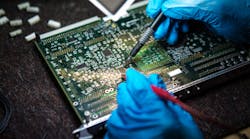For decades, Advanced Micro Devices, the world's second largest maker of computer and graphics chips, manufactured all the chips it designed. But in 2008, AMD divested from its manufacturing operations, forming Globalfoundries in the process. As part of the deal, the Silicon Valley company arranged a wafer supply agreement with Globalfoundries that has remained in place for the last decade.
AMD recently said that it had updated the deal with Globalfoundries to reflect their changing strategies. The deal stipulates the volume and price of wafers that AMD will purchase from its former manufacturing unit through 2021. AMD is forced to pay Globalfoundries a portion of the difference any year it falls short of its purchase agreement. It also allows AMD to work with other companies at the 7-nanometer node.
Last year, Globalfoundries halted the development of its 7-nanometer node. The second largest contract manufacturer of chips said that it would not have had enough customers to recoup the investment in the 7-nanometer node, which had grown to billions of dollars. "We are shifting our resources and focus by doubling down on our investments in differentiated technologies," CEO Thomas Caulfield said in August.
That posed a problem for AMD. The company was planning to produce its latest processors on the 7-nanometer node in an attempt to jump ahead of Intel, which has fallen behind on the development of chips based on 10-nanometers. So in August, AMD said it would commission its latest line of chips from Taiwan Semiconductor Manufacturing Corporation, which had already started 7-nanometer production.
Globalfoundries "continues to be a critical supplier of AMD's current generation products and will play a key role in our next generation Ryzen and Epyc products," AMD's chief executive officer Lisa Su said on a conference call last month. Under the terms of the updated deal, AMD is allowed to commission other companies for more advanced technologies, including 7-nanometers, without incurring any penalties.
That works for AMD, which is building chips assembled from modular slabs of silicon, more commonly called chiplets. These parts can be based on different process nodes and combined on the same substrate to improve efficiency and cut costs compared to traditional chips. AMD's latest line of server chips combine a processor based on TSMC's 7-nanometer node with 14-nanometer I/O from Globalfoundries.
